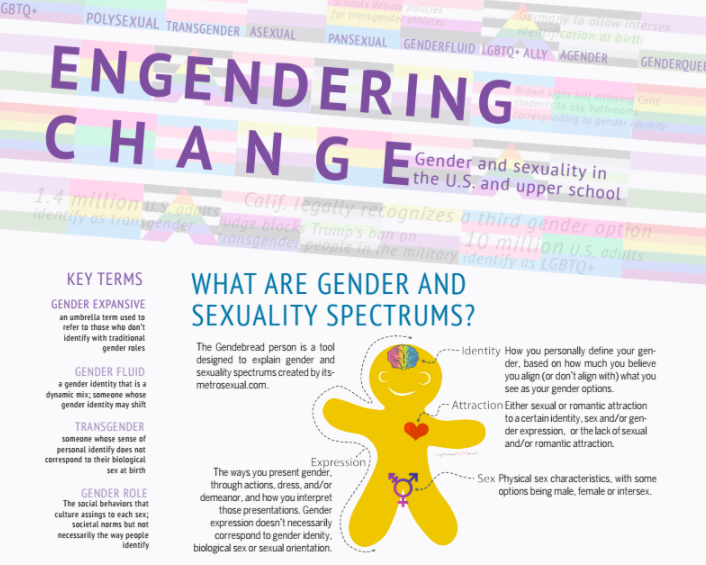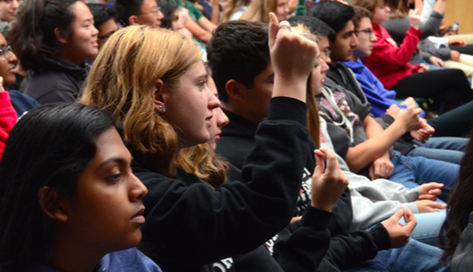Students reflect on gender assembly
November 16, 2017
Harker invited guest speaker Maureen Johnston, a licensed marriage and family therapist with a practice in San Jose, to present to the upper school on Oct. 18. In the presentations that she gave to the students, Johnston discussed gender identity, gender roles and stereotypes as well as depression and anxiety.
Johnston described gender as a spectrum rather than as either male or female and explained that everyone’s gender identity lies somewhere on the spectrum.
“I want you to know your gender does not define you; you define your gender,” Johnston said.
In her presentation, Johnston talked about the history and progress of the LGBTQ+ community as well as current issues that members still have to face. Until June 26, 2015, same-sex marriage was still illegal in parts of the United States. Even after its legalization, same-sex couples still receive far fewer privileges and benefits than heterosexual couples.
Heterosexual couples in the United States with marriage licences receive more than 1,000 legal protections and benefits to safeguard their families and protect themselves. Privileges such as hospital visitations, child custody, adoption, divorce protections, access to family insurance policies, exemption from property tax upon death of a spouse and retirement benefits are denied to married gay couples.
Some students expressed their concerns with the presentation, which they felt was too broad and did not delve into the topics enough.
“There were slight problems––I don’t want to say problems––but she wasn’t very clear, she didn’t demand attention and she made depression and anxiety such a separate thing,” Gender and Sexuality Alliance (GSA) member Alissa Gao (9) said. “We thought there should have been another assembly just covering those two subjects.”
Johnston accepts the constructive criticism and agrees that her presentation would have been better with more time.
“I absolutely agree,” Johnston said. “There was way too much that I covered, and some of that was a result of the limited time that I had and some of the restrictions that the school put on me in terms of what they wanted [covered]. We were covering three really important topics all in less than one hour. It’s a really valid criticism, and there were some hard decisions that I had to make.”
GSA is discussing organizing a student-run assembly in which LGBTQ+ students can speak about their own experiences.
“One of the main problems we had with the presenter is that she was talking from a cisgender viewpoint, and we have people in the GSA who would be willing to talk about this who are actually transgender and have gone through these kinds of situations and would probably relate to the students more as well,” Alissa said.
In addition to facing social discrimination, many members of the LGBTQ+ community also face systematic discrimination, including housing difficulties, workplace and insurance discrimination, inadequate access to affirming, affordable health care and exclusions in transgender-related health-care. The transgender community is still fighting for access to gender-neutral bathrooms.
“One of the things we didn’t talk at all about is the generational differences and that people your age are so much more accepting, so much more understanding,” Johnston said. “When I started working with the trans community, about 15 years ago, I had to hunt, I had to work so hard to find any information at all. Now, you can find out all kinds of information and you guys are exposed to this at a completely different level. That’s one of the things that makes me so hopeful. This is just part of your world. You get far more resistance from old people than you do from young people.”
Johnston emphasized the importance of having a supportive community. According to the California Health Interview Survey, one in five transgender adults in California has attempted suicide — a rate six times that of California’s cisgender adult population.
“[A supporting community] makes a huge difference. It makes life and death difference,” Johnston said. “The number of people who have attempted suicide who are not supported in their gender identity it’s heartbreaking. Absolutely heartbreaking.”
Education plays a big role in helping spread awareness and counteracting homophobia and transphobia. Students can join the GSA to support LGBTQ+ rights and learn more about relevant issues.
“If you hear anyone using hateful terms, micro-aggressions, making fun, saying my gender is an attack helicopter, call them out on it, say that that’s not cool.”GSA co-president Emilie Sanche (11) said. “Using gender neutral restrooms, tell the school that we want more. Just be someone that’s a safe person for trans and LGBTQ+ people to go to. It’s a lot of the micro-aggressions part that’s really impacting the students.”

